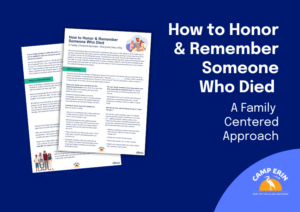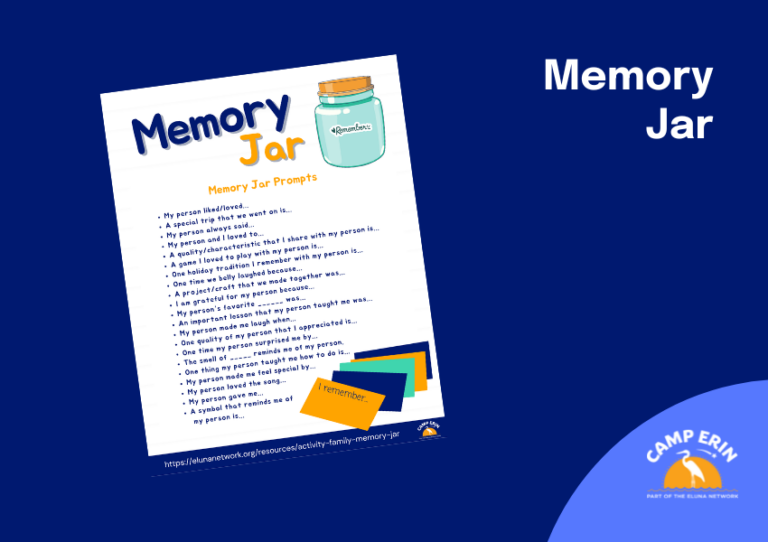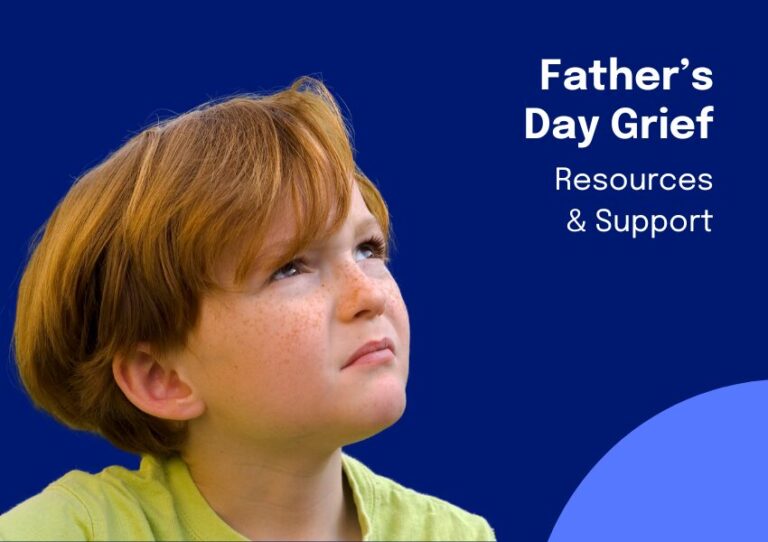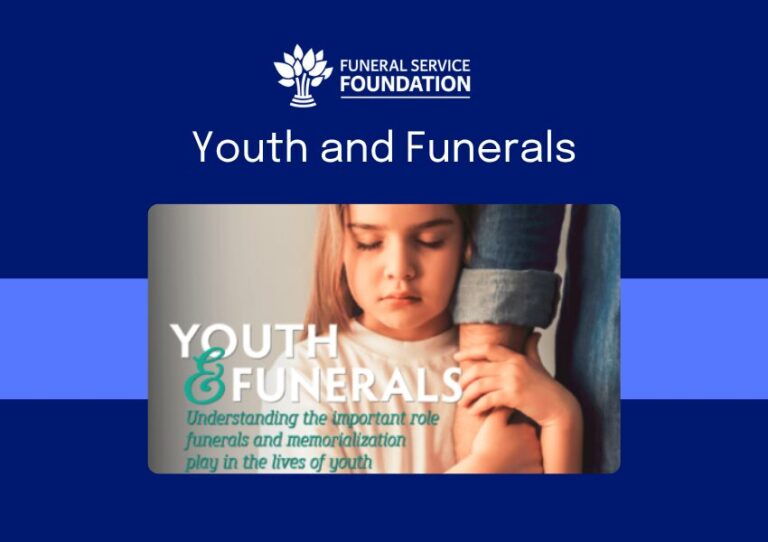How to Honor & Remember Someone Who Died – A Family Centered Approach
 We know that thinking about and planning for a significant date, event, anniversary, birthday, or life milestone in the midst of grief can feel overwhelming. Many times, grief can take the comforting feeling of being in control and throw it out the window, and we can be left feeling unsure, overwhelmed, or just lost.
We know that thinking about and planning for a significant date, event, anniversary, birthday, or life milestone in the midst of grief can feel overwhelming. Many times, grief can take the comforting feeling of being in control and throw it out the window, and we can be left feeling unsure, overwhelmed, or just lost.
This can also happen to other people in our family, such as children and teens. Some share that they feel their voices are not heard or they have little to no say in decision making when it comes to building outlets for honoring and remembering the person/people who have died.
So, let’s lay out some ideas on how to ensure that everyone’s voice is heard and validated throughout this process. Read below or download this resource.
Grief Check-In:
It can be nice to start by offering a “temperature check” for everyone in the family (who you would like to be part of the process). Try starting with something like, “We have ______________ coming up and I would like to see how everyone is feeling about it. Would you like to share?” This is a great start to open up lines of communication. From here, we can ask about topics such as:
Does your family have a tradition for this date/event/milestone? If so, check in to see if this still feels right or if something else would feel better this time around. Sometimes keeping traditions can feel comfortable, while other times it can feel awkward. Decide what you need for this specific thing and know that these can shift and change over time.
Looking to move away from traditions? Here are some fun ideas:
- Opt out of a traditional family holiday gathering to stay home as a family. Order pizza and have a movie marathon day.
- Not looking forward to the traditional foods served on a certain day? Mix it up and try new recipes or go to the store as a family and let everyone pick out one new food they would like to try.
- Take a day trip to go hiking or to a park. This is a free way to spend a day getting some sun and fresh air.
- Ask family members what they would like to do. Children and teens have great ideas about trying new things and feeling out what feels good/right to them.
Do your family members have ideas about how they would like to mark this time? Or maybe your family opts out of doing anything this time around. Remember that it is ok to do the same thing you always have, something totally new, or even choose to do nothing – there’s no right or wrong thing!
How do we even start thinking of how to “mark the day”? We may be used to society’s ways of “marking” events around the death of someone in our lives (i.e. – lighting a candle, visiting a grave, etc.). These are nice ways to remember someone, but we can also remember them by embracing things they loved while they were alive, such as:
- Making or getting your person’s favorite food (like having a make-your-own ice cream sundae bar).
- Visiting one of their favorite places.
- Plant a tree, garden, etc. in their memory.
- Gather your support system for a day of good food, company, and support.
Marking the Event:
If your family decides to mark this event, it can be helpful to ask how everyone would like to be involved. We can ask questions such as: “Would you like to be involved?” And, “If so, what feels important for you?” or “What would you like your role to be?” These questions help ourselves and our family members to feel whatever level of comfort and control we would like around this event.
Gentle Reminder: Some people may opt out of being involved. While we may take that personally, it can be good to remind ourselves that everyone grieves differently and needs different things. This may be just what they need at this moment in time.
Keep Communicating:
Many times family members may try to protect each other and put other’s needs first. The family may have decided on a way to mark the day, but as it gets closer, a family member might not be feeling as comfortable with this decision as they once were.
Keep communicating with one another to see how everyone is feeling and express how you are feeling. As we check in with each other, we can model that waves of grief are to be expected and respected. Work together to find ways to support every member of the family that is involved in this planning.
Sometimes it may feel tricky to share your own thoughts and feelings. As a caregiver, we may feel the pressure to “be strong” for the family. But, have you ever felt waves or bursts of grief? Allowing yourself to cry, feel, share, and accept support also takes a tremendous amount of strength. Modeling that grief is a normal part of missing someone who has died, communicating with trusted people in your life about your feelings, and asking for what you need can be a gift that you give to others in your family.
Focus on the Family:
Everyone has ideas and suggestions about how to mark these events, how a family should spend the time, what roles everyone should play, and how things should look overall. (Even we are giving suggestions!)
What we encourage most is that you listen to yourself and those you would like involved during these events/times. You and your family know what is most needed and what would feel best to do together, including who gets invited to be part of this event or way of remembering your person.
There may be days where none of you know what you need or want when it comes to a special date or event – this is natural. You are new at living life without this person physically present. Please be gentle with yourself and others in your family if you are feeling confused or at a loss for what to do.
This is where we would once more encourage open communication and flexibility within your family unit. We are all learning and growing through this experience and it can be comforting to do this in a community where we all feel safe, heard, understood, and respected.
*Thank you to Eluna’s Bereavement Programs Manager, Kiri Meyer, MS, LPC, NCC, RYT-200, for creating this resource!


